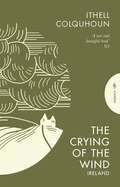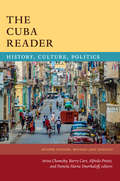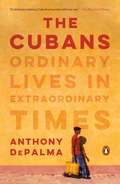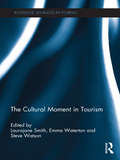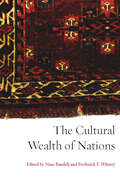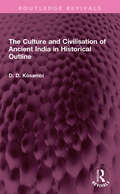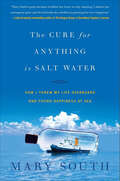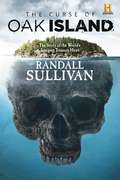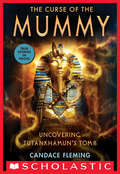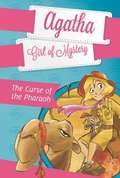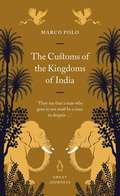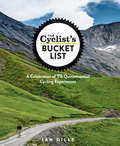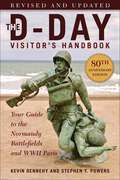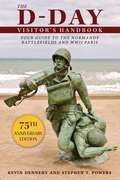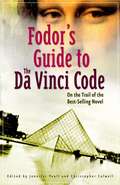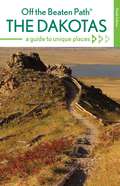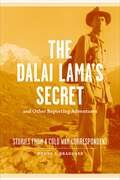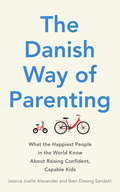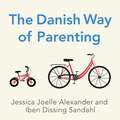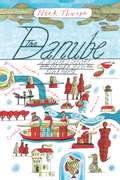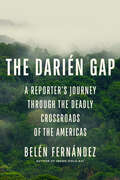- Table View
- List View
The Cruise of the Snark
by Jack LondonThe Cruise of the Snark (1911) is a memoir of Jack and Charmian London''s 1907-1909 voyage across the Pacific. His descriptions of surf-riding, which he dubbed a royal sport, helped introduce it to and popularize it with the mainland. London writes: Through the white crest of a breaker suddenly appears a dark figure, erect, a man-fish or a sea-god, on the very forward face of the crest where the top falls over and down, driving in toward shore, buried to his loins in smoking spray, caught up by the sea and flung landward, bodily, a quarter of a mile. It is a Kanaka on a surf-board. And I know that when I have finished these lines I shall be out in that riot of colour and pounding surf, trying to bit those breakers even as he, and failing as he never failed, but living life as the best of us may live it. . from Wikipedia, The Free Encyclopedia. Intuitive navigation. . Text annotation and mark-up. .
The Crying of the Wind: Ireland (Pushkin Press Classics)
by Ithell ColquhounA classic travelogue exploring the meeting point of Ireland's landscape and legends, by Britain's foremost female surrealist painter&“Colquhoun has a very beguiling pen. . . To Irish landscapes she brings a painter's eye, writing particularly beautifully about skies, twilights, river valleys, sea-frayed coasts and the intensive atmosphere of remote places&” — TatlerInto the world of 1950s Ireland—a lushly green, windswept landscape studded with holy wells and the decaying country houses of a vanished ruling class—arrives Ithell Colquhoun.An occultist and a surrealist painter, Colquhoun's travels around the island are guided by her artist's eye and her feeling for the world beyond our own, as well as her spikily humorous view of the people she meets. We encounter faeries and pagan rituals, ruined churches and Celtic splendour, rowdy bohemians and Anglo-Irish landowners fallen on hard times, as the author carouses through Dublin and tramps the hills of Connemara in this classic travelogue.Through her unique perceptions we discover a land that is fiercely alive and compelling. It is a place where the wind cries, the stones tell old tales and the mountains watch over the roads and those who travel on them. By intuiting the eerie magic of Ireland, Colquhoun casts her own spell. She offers up a land of myth and legend, stripped of its modern signs, at the same time offering herself to the reader in this portrait of the artist as a young woman.Richly visual and full of sly wit, this is an account of Ireland as only Colquhoun could see it, a land where myth and magic meet wind and rain, and the song of the secret kingdom is heard on city streets.
The Cuba Reader: History, Culture, Politics (The Latin America Readers)
by Aviva Chomsky Barry Carr Pamela Maria Smorkaloff Alfredo PrietoTracking Cuban history from 1492 to the present, The Cuba Reader includes more than one hundred selections that present myriad perspectives on Cuba's history, culture, and politics. The volume foregrounds the experience of Cubans from all walks of life, including slaves, prostitutes, doctors, activists, and historians. Combining songs, poetry, fiction, journalism, political speeches, and many other types of documents, this revised and updated second edition of The Cuba Reader contains over twenty new selections that explore the changes and continuities in Cuba since Fidel Castro stepped down from power in 2006. For students, travelers, and all those who want to know more about the island nation just ninety miles south of Florida, The Cuba Reader is an invaluable introduction.
The Cubans: Ordinary Lives in Extraordinary Times
by Anthony DePalmaModern Cuba comes alive in a vibrant portrait of a group of families's varied journeys in one community over the last twenty years. <P><P>Cubans today, most of whom have lived their entire lives under the Castro regime, are hesitantly embracing the future. In his new book, Anthony DePalma, a veteran reporter with years of experience in Cuba, focuses on a neighborhood across the harbor from Old Havana to dramatize the optimism as well as the enormous challenges that Cubans face: a moving snapshot of Cuba with all its contradictions as the new regime opens the gate to the capitalism that Fidel railed against for so long. <P><P>In Guanabacoa, longtime residents prove enterprising in the extreme. Scrounging materials in the black market, Cary Luisa Limonta Ewen has started her own small manufacturing business, a surprising turn for a former ranking member of the Communist Party. Her good friend Lili, a loyal Communist, heads the neighborhood's watchdog revolutionary committee. <P><P>Artist Arturo Montoto, who had long lived and worked in Mexico, moved back to Cuba when he saw improving conditions but complains like any artist about recognition. In stark contrast, Jorge García lives in Miami and continues to seek justice for the sinking of a tugboat full of refugees, a tragedy that claimed the lives of his son, grandson, and twelve other family members, a massacre for which the government denies any role. In The Cubans, many patriots face one new question: is their loyalty to the revolution, or to their country? <P><P>As people try to navigate their new reality, Cuba has become an improvised country, an old machine kept running with equal measures of ingenuity and desperation. A new kind of revolutionary spirit thrives beneath the conformity of a half century of totalitarian rule. And over all of this looms the United States, with its unpredictable policies, which warmed towards its neighbor under one administration but whose policies have now taken on a chill reminiscent of the Cold War.
The Cultural Moment in Tourism (Advances in Tourism)
by Emma Waterton Steve Watson Laurajane SmithThis book is a response to the burgeoning interest in cultural tourism and the associated need for a coherently theorized approach for understanding the practices that such an interest creates. Cultural tourism has become an important and popular aspect of contemporary tourism studies, as well as providing a rich seam of upscale product development opportunities in the industry as a whole. Much of the related literature, however, focuses upon describing and categorizing cultural tourism from a supply-side perspective. This has prompted the taxonomizing of cultural tourists on the basis of their level of involvement and interest in cultural tourism products and/or their economic worth as a sought after market segment. There have been few recent attempts at a rigorous re-theorization of the issues beyond conventional representational theories; this book aims to fill that void. This groundbreaking volume provides a theoretical and empirical account of what it means to be a cultural or heritage tourist. It achieves this by exploring the interactions of people with places, spaces, intangible heritage and ways of life, not as linear alignments but as seductive ‘moments’ of encounter, engagement, performance and meaning-making, which are constitutive of cultural experience in its broadest sense. The book further explores encounters in cultural tourism as events that capture and constitute important social relations involving power and authority, self-consciousness and social position, gender and space, history and the present. It also explores the consequences these insights have for our understanding of culture and heritage and its management in the context of tourist activity. In capturing the ‘cultural moment’, this book provides a better understanding of the motivations, on-site activities, meaning constructions and other cultural work done by both tourists and tourist operators. The volume confronts and explores the cultural, political and economical interrelations between culture, heritage and the tourism industry. In so doing, it also investigates how this co-mingling of identity, representation and social life may be better apprehended with the wider shift in critical thought towards notions of affect and performativity. The book is a fundamental and influential contribution to research in this field. It will be of significant value to students, academics and researchers interested in this broad topic area.
The Cultural Wealth of Nations
by Nina Bandelj Frederick F. WherrySymbolic resources affect social, cultural, and economic development. The value of being "Made in America" or "Made in Italy," for example, depends not only on the material advantages each place offers but also on the symbolic resources embedded in those places of production. Drawing on case studies that range from the vineyards of South Africa and the textiles of Thailand to the Mundo Maya in Latin America and tourist destinations in Tuscany, this volume examines the various forms that cultural wealth takes, the processes involved in its construction, and the ways it is deployed. Leading scholars from a range of disciplinary backgrounds examine how symbolic resources and cultural understandings help firms and regions develop. Through a thoughtful analysis of current- day cases, as well as historical developments,The Cultural Wealth of Nationsoffers an exciting new alternative to standard economic explanations about the wealth and poverty of nations.
The Culture and Civilisation of Ancient India in HIstorical Outline (Routledge Revivals)
by D D KosambiFirst published in 1965, The Culture and Civilisation of Ancient India in Historical Outline is a strikingly original work, the first real cultural history of India. The main features of the Indian character are traced back into remote antiquity as the natural outgrowth of historical process. Did the change from food gathering and the pastoral life to agriculture make new religions necessary? Why did the Indian cities vanish with hardly a trace and leave no memory? Who were the Aryans – if any? Why should Buddhism, Jainism, and so many other sects of the same type come into being at one time and in the same region? How could Buddhism spread over so large a part of Asia while dying out completely in the land of its origin? What caused the rise and collapse of the Magadhan empire; was the Gupta empire fundamentally different from its great predecessor, or just one more ‘oriental despotism’? These are some of the many questions handled with great insight, yet in the simplest terms, in this stimulating work. This book will be of interest to students of history, sociology, archaeology, anthropology, cultural studies, South Asian studies and ethnic studies.
The Cure for Anything Is Salt Water: How I Threw My Life Overboard and Found Happiness at Sea
by Mary SouthAt forty, Mary South had a beautiful home, good friends, and a successful career in book publishing. But she couldn't help feeling that she was missing something intangible but essential. So she decided to go looking for it . . . at sea. Six months later she had quit her job, sold the house, and was living aboard a forty-foot, thirty-ton steel trawler she rechristened Bossanova. Despite her total lack of experience, South set out on her maiden voyage—a fifteen-hundred-mile odyssey from Florida to Maine—with her one-man, two-dog crew. But what began as the fulfillment of an idle wish became a crash course in navigating the complicated byways of the self.
The Curse Of Oak Island
by Randall SullivanIn 1795, a teenager discovered a mysterious circular depression in the ground on Oak Island, in Nova Scotia, Canada, and ignited rumors of buried treasure. Early excavators uncovered a clay-lined shaft containing layers of soil interspersed with wooden platforms, but when they reached a depth of ninety feet, water poured into the shaft and made further digging impossible. Since then the mystery of Oak Island's "Money Pit" has enthralled generations of treasure hunters, including a Boston insurance salesman whose obsession ruined him; young Franklin Delano Roosevelt; and film star Errol Flynn. Perplexing discoveries have ignited explorers' imaginations: a flat stone inscribed in code; a flood tunnel draining from a man-made beach; a torn scrap of parchment; stone markers forming a huge cross. Swaths of the island were bulldozed looking for answers; excavation attempts have claimed two lives. Theories abound as to what's hidden on Oak Island--pirates' treasure, Marie Antoinette's lost jewels, the Holy Grail, proof that Sir Francis Bacon was the true author of Shakespeare's plays--yet to this day, the Money Pit remains an enigma. The Curse of Oak Island is a fascinating account of the strange, rich history of the island and the intrepid treasure hunters who have driven themselves to financial ruin, psychotic breakdowns, and even death in pursuit of answers. And as Michigan brothers Marty and Rick Lagina become the latest to attempt to solve the mystery, as documented on the History Channel's television show The Curse of Oak Island, Sullivan takes readers along to follow their quest firsthand.
The Curse of the Mummy: Uncovering Tutankhamun's Tomb (Scholastic Focus)
by Candace FlemingAward-winning and critically acclaimed author Candace Fleming presents the edge-of-your-seat true story of the search for Tutankhamun's tomb, the Western public's belief that the dig was cursed, and the battle for ownership of the treasures within.During the reign of the New Kingdom of Egypt, the boy pharaoh Tutankhamun ruled and died tragically young. In order to send him on his way into the afterlife, his tomb was filled with every treasure he would need after death. And then, it was lost to time, buried in the sands of the Valley of the Kings.His tomb was also said to be cursed.Centuries later, as Egypt-mania gripped Europe, two Brits -- a rich earl with a habit for gambling and a disreputable, determined archeologist -- worked for years to rediscover and open Tutankhamun's tomb. But once it was uncovered, would ancient powers take their revenge for disturbing and even looting the pharaoh's resting place? What else could explain the mysterious illnesses, accidents, and deaths that began once it was found?
The Curse of the Pharaoh #1
by Stefano Turconi Sir Steve StevensonAgatha: Girl of Mystery is a fanciful and fabulous new mystery series about a headstrong girl detective who jets off on exotic and international adventures with the help of her hulking bodyguard and loyal cat named, aptly, Watson. The first mystery in this series sees young detective Agatha Mistery traveling to Egypt. Rumors of a mysterious tablet unearthed in the Valley of the Kings may be just the clue that Agatha needs to unlock the secret curse of an ancient Pharaoh.
The Customs of the Kingdoms of India (Great Journeys Ser.)
by Marco PoloAs Marco Polo (1254-1324) returned home across the Indian Ocean, after years in the service of Genghis Khan, he picked up a fabulous array of stories from sailors and merchants, about the peoples of the region, some reliable, some wholly implausible, but all fascinating.Great Journeys allows readers to travel both around the planet and back through the centuries – but also back into ideas and worlds frightening, ruthless and cruel in different ways from our own. Few reading experiences can begin to match that of engaging with writers who saw astounding things: Great civilisations, walls of ice, violent and implacable jungles, deserts and mountains, multitudes of birds and flowers new to science. Reading these books is to see the world afresh, to rediscover a time when many cultures were quite strange to each other, where legends and stories were treated as facts and in which so much was still to be discovered.
The Cyclist's Bucket List: A Celebration of 75 Quintessential Cycling Experiences
by Ian DilleThe smell of lavender at a roadside picnic, waiting for the Tour de France to race past. The Pacific Ocean view from the 10,000-foot summit of Hawaii's Haleakala volcanic crater (after 5 hours of uphill riding). A fresh Fat Tire ale hitting your lips at the new Belgium brewery in Fort Collins, Colorado. These, and a wide-ranging variety of other experiences, all rooted to a specific location or event, comprise The Cyclist's Bucket List. The book definitively catalogs both the iconic and little known-the accessible and aspirational-sensory and emotional experiences that instill cyclists with a deep passion for the sport.In this book, Ian Dille compiles and showcases the world's quintessential cycling experiences through extensive research and interviews with expert sources, vivid storytelling, stunning photography, and compelling design. The format includes lengthy in-depth descriptions as well as much shorter, easy to consume write-ups, ranging from locations such as Italy and Belgium to Nova Scotia and Texas.The Cyclist's Bucket List will serve as an indispensible, lifelong guide for every cyclist.
The D-Day Visitor's Handbook, 80th Anniversary Edition: Your Guide to the Normandy Battlefields and WWII Paris, Revised and Updated
by Kevin Dennehy Stephen T. PowersUpdated for the 80th anniversary of D-Day. For families of the heroes who fought on the beaches of Normandy during World War II, for fans of Saving Private Ryan, or for traveler interested in history, here is the complete guide to visiting one of the world&’s most historic battlefields.The D-Day Visitor&’s Handbook includes everything you need to know to plan and make your visit to the site of the biggest seaborne invasion in history. This compact guidebook not only describes the most significant land invasion of World War II, but provides detailed battlefield maps and tours, identifies monuments and attractions, and locates museums and historical sites to make your planning easier and less stressful. This guide provides everything you need ahead of your visit, including: Easy-to-follow maps and tours Where to stay, dine, and shop Lists of the best D-Day museums How to find war relics still at the battlefield sites Historical context for each site, including a description of military action there A special bonus guide to World War II history and sites in Paris The D-Day Visitor&’s Handbook contains a wealth of detailed information that is perfect for those considering travelling to France, anyone about to visit these sites, veterans, students of military history, and any others who wish to learn about the history of this legendary battle.
The D-Day Visitor's Handbook: Your Guide to the Normandy Battlefields and WWII Paris
by Stephen Powers Kevin DennehyThe complete guide to visiting one of the most famous sites in the history of warfare, just in time for the 75th anniversary of D-Day.The D-Day Visitor’s Handbook includes everything you need to know to plan and make your visit to the site of the biggest seaborne invasion in history. Newly updated and revised in time for the 75th anniversary of the battle, this compact guidebook not only describes the most significant land invasion of World War II, but provides detailed battlefield maps and tours, identifies monuments and attractions, and locates museums and historical sites to make your planning easier and less stressful.This guide provides everything you need ahead of your visit, including: Easy-to-follow maps and toursWhere to stay, dine, and shopLists of the best D-Day museumsHow to find war relics still at the battlefield sitesHistorical context for each site, including a description of military action thereA special bonus guide to World War II history and sites in ParisThe D-Day Visitor’s Handbook contains a wealth of detailed information that is perfect for those considering travelling to France, anyone about to visit these sites, veterans, students of military history, and any others who wish to learn about the history of this legendary battle.
The Da Vinci Code Companion
by Fodor'sThis guide to the best-selling novel gives you fresh insight into the Da Vinci Code phenomenon. Following the path of the novel's characters, Fodor's Guide to The Da Vinci Code delves into the locations, people, historic events, and symbols involved in the story.Inside you'll find answers to questions such as: Do cryptexes really exist? Is there a secret chamber below Rosslyn Chapel? And what did conservators discover when they restored Leonardo's The Last Supper? Interviews, maps, and smart lively essays from experts in their fields reveal the eye-opening true tales behind the mystery. Plus* Compelling interviews and essays from experts in their fields* Detailed maps and floor plans* BONUS! An exclusive travel sections of Da Vinci Code-related places to eat, stay and see in Paris, London, Rome, and Roslin, Scotland
The Dakotas Off the Beaten Path®: A Guide to Unique Places (Off the Beaten Path Series)
by Lisa Meyers McClintickTired of the same old tourist traps? Whether you&’re a visitor or a local looking for something different, let The Dakotas Off the Beaten Path show you a side of North and South Dakota you never knew existed. See the house Pa built during the annual Laura Ingalls Wilder Pageant in De Smet, South Dakota. Excavate mammoth bones in the Black Hills or spelunk in some of the world&’s largest caves. Dance to Norwegian fiddles at North America&’s largest Scandinavian festival, or lose yourself in the brilliant splendor of a powwow. So if you&’ve &“been there, done that&” one too many times, get off the main road and venture Off the Beaten Path.
The Dalai Lama's Secret and Other Reporting Adventures: Stories from a Cold War Correspondent
by Henry S. BradsherFor over a quarter of a century, award-winning journalist Henry Bradsher reported stories from around the world. In this lively and engaging account, Bradsher recounts episodes from a distinguished career that took him to the Himalayas, the jungles of Bhutan, Kremlin caviar receptions, China's Forbidden City, and the battlefields of Vietnam. Throughout, Bradsher emphasizes the unpredictability of a correspondent's life and the strains, perils, and privileges of standing witness to momentous world events.In South Asia, Bradsher reported the Dalai Lama's escape from Tibet in 1959 and the last five years that Jawaharlal Nehru led India -- with a side trip to hunt tigers in Nepal with Queen Elizabeth. In Moscow he covered the downfall of Nikita Khrushchev, and he later suffered the KGB bombing of his car in response to his tenacious reporting. His incisive coverage from Hong Kong led Chinese officials to label Bradsher as "the most despicable" journalist. But after a power shift, they welcomed him as the first American journalist allowed to work in China in over a year. Bradsher predicted and reported Bangladesh's independence struggle, and he worked in the Middle East, covering Egyptian-Israeli peace arrangements. Access to the events that shaped the Cold War also led to Bradsher's meeting many world leaders, including Nehru, Khrushchev, Leonid Brezhnev, Zhou Enlai, Richard Nixon, Gerald Ford, Jimmy Carter, Ronald Reagan, Anwar Sadat, and Menachem Begin. Although Bradsher's reporting riled officials in Moscow, Beijing, and even the United States -- prompting Henry Kissinger's attempts to thwart the publication of his reports -- history has proven its accuracy. Bradsher's relentlessness in his own work accompanied a profound respect for fellow journalists worldwide who endanger themselves to keep the public informed.
The Danish Secret to Happy Kids: How the Viking Way of Raising Children Makes Them Happier, Healthier, and More Independent
by Helen Russell"Smart, witty and packed with surprising facts about life in the Nordics, The Danish Secret to Happy Kids is a foolproof roadmap to raising kids the Viking way. If you enjoy Helen Russell's signature self-deprecating sense of humor and captivating storytelling, you're in for a real treat." —Linda Åkeson McGurk, author of There's No Such Thing as Bad Weather and The Open-Air LifeWhat do Vikings know about raising children? Turns out, quite a bit. After a decade of living in Denmark, and raising her three kids there, Helen Russell noticed that Nordic kids (or mini-Vikings) are different from children raised in other parts of the world. They eat differently. They learn differently. They play, dress, and even sleep differently. They run, jump, climb, fall and get up again, out in nature, for hours a day. It's cold and wet and uncomfortable—often. But they cope. Even though the weather's terrible and it's dark October through March. And then they grow up to be some of the happiest adults on the planet. So her question was: how?In The Danish Secret to Happy Kids, Russell dives deep into the parenting culture of Denmark and the other Nordic nations, from parental leave policies to school structure to screen time, uncovering surprising strategies and customs that lead to largely happy, well-adjusted humans over the long term. This fascinating peek behind the cultural curtain allows readers to marvel over infants comfortably sleeping outside in chilly temperatures, school-age kids wielding axes in the woods, and teenagers spending a year or two at efterskole, a special boarding school designed to prepare adolescents for independent life in the real world—a concept that is beginning to be adopted in other nations.Refreshingly funny and unfailingly optimistic about the new generation of humans growing up in the world right now, The Danish Secret to Happy Kids is a heart-warming love letter to Russell's adopted homeland, a comforting armchair travel read, and proof that we could all use a bit more Viking in our everyday lives.
The Danish Way of Parenting: What the Happiest People in the World Know About Raising Confident, Capable Kids
by Jessica Joelle Alexander Iben Dissing Sandahl'A shining alternative to high-stress modern parenting, and families from New Delhi to New York will shout with joy' Heather Shumaker, author of It's OK Not to Share and It's OK to Go Up the SlideDISCOVER THE PARENTING SECRETS OF THE HAPPIEST PEOPLE IN THE WORLDWhat makes Denmark the happiest country in the world -- and how do Danish parents raise happy, confident, successful kids, year after year? This upbeat and practical guide reveals the six essential principles that have been working for parents in Denmark for decades:- Play: essential for development and well-being- Authenticity: fosters trust and an 'inner compass'- Reframing: helps kids cope with setbacks and look on the bright side- Empathy: allows us to act with kindness towards others- No ultimatums: no power struggles or resentment- Togetherness: a way to celebrate family time, on special occasions and every dayA revealing and fresh take on parenting advice, The Danish Way of Parenting will help parents from all walks of life raise the happiest, most well-adjusted kids in the world.
The Danish Way of Parenting: What the Happiest People in the World Know About Raising Confident, Capable Kids
by Jessica Joelle Alexander Iben Dissing Sandahl'A shining alternative to high-stress modern parenting, and families from New Delhi to New York will shout with joy' Heather Shumaker, author of It's OK Not to Share and It's OK to Go Up the SlideDISCOVER THE PARENTING SECRETS OF THE HAPPIEST PEOPLE IN THE WORLDWhat makes Denmark the happiest country in the world -- and how do Danish parents raise happy, confident, successful kids, year after year? This upbeat and practical guide reveals the six essential principles that have been working for parents in Denmark for decades:- Play: essential for development and well-being- Authenticity: fosters trust and an 'inner compass'- Reframing: helps kids cope with setbacks and look on the bright side- Empathy: allows us to act with kindness towards others- No ultimatums: no power struggles or resentment- Togetherness: a way to celebrate family time, on special occasions and every dayA revealing and fresh take on parenting advice, The Danish Way of Parenting will help parents from all walks of life raise the happiest, most well-adjusted kids in the world.
The Danube
by Nick Thorpehopkeepers, beekeepers, waitresses, smugglers and border policemen, legal and illegal immigrants, and many more. For readers who anticipate their own journeys on the Danube, as well as those who only dream of seeing the great river, this book will be a unique and treasured guide.
The Darién Gap: A Reporter's Journey through the Deadly Crossroads of the Americas
by Belén FernándezThe narrow Darién Gap, the only land bridge connecting South and Central America, encompasses a spectacularly hostile jungle, covered in steep mountains, dense rainforests, and flood-prone marshes. Known in Spanish as el infierno verde, or “the green hell,” it is one of the most inhospitable places in the world. Its terrain is too treacherous for roads, yet hundreds of thousands of refuge seekers contend with its horrors every year in the hopes of reaching the United States, still some three thousand miles away. And of the countless who set out for the border, an untold number never arrive. In this book, journalist Belén Fernández visits the Darién Gap to report on the dehumanizing and deadly stretch of land that has become a mass graveyard for migrants. Fernández’s travels bring her into contact with refuge seekers, people smugglers, law enforcement officials, and many more whose stories bring life to a place overwhelmingly associated with death. Combining history, on-the-ground reporting, travelogue, memoir, and searing politico-economic analysis, she shines light on a largely made-in-the-USA crisis that has come to define our modern era. Engrossing and heartrending, The Darién Gap is a poignant and compassionate indictment of structural inequality and institutionalized inhumanity in a world where the have-nots must risk death for a chance at a better life—or any life at all.
The Dark Angel: A Lola and Ingrid Investigation
by Dominique SylvainOn the one hand, there's Lola. A grumpy retired policewoman who cannot get by without her two best friends: red wine and jigsaw puzzles. On the other, there's Ingrid, an American in love with Paris. By day she gives the best massages in the city, and her long nights are wilder still... Their paths might not have crossed were it not for the murder of a young neighbour. Vanessa Ringer's body is found in the flat she shared with two schoolfriends, mutilated in the most cruel and unusual manner. Suspicion falls on Maxime Duchamp, a charming restaurateur whose suave exterior hides a tragic past. Convinced of his innocence, Lola and Ingrid hit the streets to unmask the real killer. Meanwhile, lying low, the victim's spurned lover, a high-stakes thief with one last heist to go, is plotting his revenge. His inner demon, the Dark Angel, has foreshadowed all...
The Dark Angel: A Lola and Ingrid Investigation (Lola & Ingrid Investigation #1)
by Dominique SylvainOn the one hand, there's Lola. A grumpy retired policewoman who cannot get by without her two best friends: red wine and jigsaw puzzles. On the other, there's Ingrid, an American in love with Paris. By day she gives the best massages in the city, and her long nights are wilder still... Their paths might not have crossed were it not for the murder of a young neighbour. Vanessa Ringer's body is found in the flat she shared with two schoolfriends, mutilated in the most cruel and unusual manner. Suspicion falls on Maxime Duchamp, a charming restaurateur whose suave exterior hides a tragic past. Convinced of his innocence, Lola and Ingrid hit the streets to unmask the real killer. Meanwhile, lying low, the victim's spurned lover, a high-stakes thief with one last heist to go, is plotting his revenge. His inner demon, the Dark Angel, has foreshadowed all...

